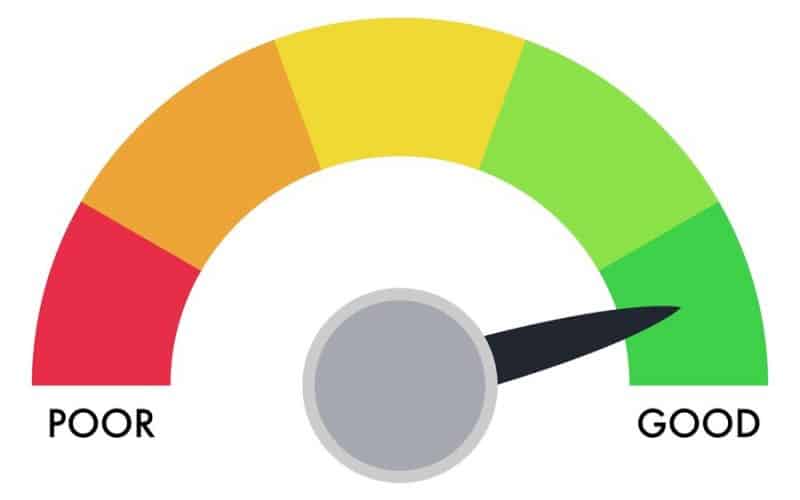Your premium is determined by a variety of factors used by insurance companies. Your carrier may consider your age, gender, ZIP code, and credit-based insurance score to determine your rate in most places, though these variables may differ depending on the state in which you reside.
In this article, we’ll go over how it works and what constitutes a good insurance score.
What is an Insurance Score?
An insurance score, often referred to as an insurance credit score, is a rating that insurance companies compute and use to show the likelihood that a person will file an insurance claim while they are covered. It is based on the person’s credit rating and will have an impact on the premiums they must pay for the insurance.
Note that:
- A consumer’s degree of risk is determined by an insurance score, which is similar to a credit rating.
- One of the key factors in determining a consumer’s monthly rate is their insurance score.
- Low ratings indicate greater dangers; values range from 200 to 997.
- For various policies, products, and rating agencies, there are different standards for a good score.
How do Insurance Scores work?
Insurance scores estimate the likelihood that a potential insured will submit a claim under their policy using the applicant’s credit score and credit history. The majority of firms use it to project their prospective losses, although it isn’t the only criteria used to set their rates.
Furthermore, they will forecast that a candidate with a high credit score and a clean payment history will have fewer claims than a candidate with a low credit score and a spotty payment history. The insurer therefore classifies the earlier applicant as having a lesser underwriting risk than the later applicant.
Additionally, a lower credit score can suggest that the applicant will struggle more to pay their premiums on time, which could lead to a lapse in coverage and cost the insurer more money in late notices and reinstatement procedures to send out and handle.
If all other factors are equal, an applicant’s insurance score may, in some cases, disqualify them from coverage or result in them paying higher premiums for the same coverage as someone with a better insurance score. A nonstandard firm may provide more options for people who are having trouble getting insurance from a standard carrier; however, the premiums will still be higher.
Therefore, in order to determine rates and eligibility, many jurisdictions mandate that insurers utilize additional underwriting factors in addition to credit scores. As of right now, the use of credit scores is restricted or prohibited in Michigan, California, Hawaii, Massachusetts, and Maryland.
How to Check Your Insurance Score
#1. First, find out if the organization that provided you with a quote used an insurance score to determine your premium. You can then request more information. Your score may vary from insurer to insurer because each business will calculate it using its own unique approach.
#2. LexisNexis, which gathers information utilized by numerous firms, is another source from which you can obtain your insurance score file. You can use an online form to submit a “Consumer Disclosure Report” request on the LexisNexis online portal.
Generally, it is simpler to obtain your credit score. You are entitled to a free copy of your credit report each year from each of the three major credit agencies (Equifax, Experian, and TransUnion) in accordance with federal law. These are available upon request at AnnualCreditReport.com.
Furthermore, it is largely influenced by your credit information, so carefully review all of the data it contains and make sure there are no mistakes. You can dispute it with the credit bureau and have it fixed if you do uncover wrong information on your credit report, such as inaccurate balances or sums shown as past due that are current. This might improve your grade.
How is an Insurance Score Calculated?
Your credit score is often used when calculating it. You might even call it a credit-based insurance score.
Your history of insurance claims and auto accidents are two other criteria that insurance providers could take into account. Firms frequently keep the particular weightings and criteria used in their ratings a secret; however, FICO utilizes the following to calculate credit scores:
Note that:
A FICO (Fair Isaac Corporation) is a tool that numerous lenders use to assess a potential borrower’s eligibility for a credit card, mortgage, or other loan.
| How FICO Determines Credit Score | |
| Payment history, or how often you make payments on time | 40% |
| Amount of outstanding debt | 30% |
| Length of credit history | 15% |
| How often have you applied for new credit? | 10% |
| Credit mix, or how many different types of credit you have | 5% |
Note that you are more likely to have a high insurance score if you have a long history of making on-time payments, a number of financial accounts in good standing, and a sizeable quantity of unused credit available. However, you’re more likely to have a poor one if you have a patchy payment history, routinely make late payments, have credit cards that are maxed out, and have lately applied for several loans.
Insurance score range
Insurance ratings typically range from 100 to 999. Different companies may utilize somewhat different ranges.
| Score | Rating |
| 100-500 | Poor |
| 501-625 | Below average |
| 626-769 | Average |
| 770+ | Good |
Does my insurance score affect my credit?
No, an insurance score does not affect your credit. Although they both take into account the same things, such as your payment history, a credit-based insurance score, and a standard credit score, they are two separate things. Insurance credit scores are used by insurers to determine how likely you are to make a claim.
Is an insurance score different from a credit score?
Your capacity to pay back loans is what determines your credit score. On the other hand, an insurance score, which is based on data acquired from policyholders with comparable credit profiles who have filed claims with us in the past, indicates the risk that you will be involved in a future accident or insurance claim.
What is an insurance score for auto insurance?
Auto insurance scores are numerical data that are used to estimate your risk of getting into an accident or filing a claim. They are determined using data from your credit reports. Additionally, in jurisdictions where it is legal, auto insurers use it as one of several factors to decide how much you will pay.
What is a good insurance score?
Companies that create insurance scores sell these raw ratings to insurance providers, who often give the ranges, levels, or descriptions. The scale or range that each company uses differs depending on the secret formula utilized to calculate it.
- Scores for insurance might be anywhere between 0 and 1,100.
- Scores over 700 are regarded as excellent.
What is a Car Insurance Score?
A car insurance score is determined by data from your credit report. Most insurers use credit information to help generate more precise rates since it is highly predictive of upcoming accidents or insurance claims.
How do I get a high insurance score?
Building up your credit score is the best strategy to raise your insurance score. You can take action by:
- Pay your bills on time. Pay attention to making timely payments on all of your expenses.
- Pay off your debt. Get current on any accounts that are past due so that you can move forward with making your essential payments on time.
- Pay down your debt. Maintain modest credit card balances while making progress on other loans.
- Avoid obtaining new credit. Apply for new credit cards or loans only if absolutely necessary.
By maintaining a safe driving record and avoiding the need to submit insurance claims, you can also raise your insurance rating.
Why is my insurance score so low?
You’re more likely to have a poor insurance score if you have a patchy payment history, routinely make late payments, have credit cards that are maxed out, and have lately applied for several loans.
Does State Farm pull credit?
All major auto insurance providers, such as GEICO, Progressive, and State Farm, run a credit check when providing quotes. In actuality, one of the key rating variables taken into account by underwriters when deciding auto insurance premiums is credit.
Does Geico use credit scores for insurance?
GEICO runs a credit check when providing quotes. In actuality, one of the key rating variables taken into account by underwriters when deciding auto insurance premiums is credit.
What states do not use credit scores for insurance?
The use of credit scores or ratings in pricing is forbidden in California, Hawaii, Massachusetts, and Michigan. For drivers with bad credit, usage-based telemetry solutions can be a suitable choice.
What is a credit-based insurance score in underwriting?
In underwriting, the score, which is based on the person’s credit rating, will have an impact on the premiums they must pay for the insurance. If it is high, it will result in lower premiums. On the other hand, a low score will mean higher premiums.
715 Credit Score: Is It a Good Credit Score
WHAT CREDIT SCORE IS NEEDED TO BUY A CAR: Credit Score You Will Need to Buy a Car in 2023
MORTGAGE CREDIT SCORE: Minimum Credit Required To Buy A Home






